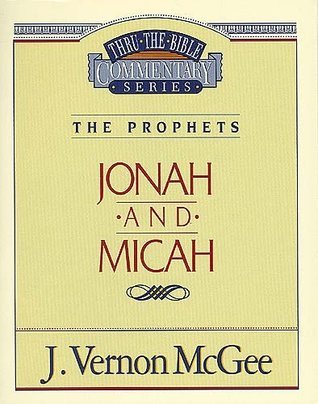First sentence: Jonah is the book of the Bible which perhaps has been criticized more than any other. Unfortunately, many Christians thoughtlessly cast aspersions upon this important book in the canon of Scripture without realizing that they are playing into the hands of the critics and innocently becoming the dupes of the skeptics.
This commentary covers two minor prophets--the books of Jonah and Micah. J. Vernon McGee continues his paragraph by paragraph commentary of the Bible. I wouldn't say that he goes into great detail with each and every verse. It's more "thought for thought" if you will. He's hoping to capture the "thought" and "meaning" of passages of bible books. If you're looking for breakdowns of Hebrew and Greek, then McGee probably isn't your man--your theologian.
McGee is very casual, very conversational. Not because he doesn't have a high view of Scripture. He believes the Bible to be the very Word of God. He believes in all the things--inerrant, infallible, inspired, authoritative, etc. But he wants to reach people--all people. Not just elite scholars, but everyone. He wants EVERYONE to feel comfortable reading, studying, comprehending the Bible.
I've read a dozen or so of McGee's commentaries. This one is slightly odd--for me. McGee's take on Jonah is perhaps not unique but not entirely expected. It was the first time I'd heard this interpretation. McGee believes that Jonah was DEAD for three days. Literally dead. God resurrected him and sent him on his way. I'd never really thought about if Jonah was DEAD or alive in the belly of the fish. I suppose it isn't a point on scripture that is absolute, that you have to make an absolute stand on. But the traditional view is that he was kept alive in the belly of the fish. Again, this was my first exposure to McGee's views. He argues that this is where the Old Testament makes it crystal clear that resurrection is possible. I think there are other examples of resurrection in the Old Testament--though perhaps not with the dead several days implication. But I don't think Jonah had to be literally dead for three days in order for Christ to make use of Jonah in his illustration.
I do like the book of Micah. I think it is a relevant book in many, many ways. But McGee got a little subtracted, in my humble opinion. Again he made a point or two that I wasn't quite on board with. Namely he argues that the United States of America is in decline (if he left it at that it might not be worth a mention) and will not be a player--a world power--in the end days because it is not mentioned by name in the Bible. I'll let you think about that for a minute. That's neither here nor there as far as I'm concerned. I'd be more concerned if the United States of America was mentioned by name in the original languages of Scripture thousands of years before Christopher Columbus sailing the ocean blue. I don't think the lack of a country's name, a state name, indicates ANYTHING positive or negative. McGee will not be popular, perhaps, for his opinion that the Great Depression and World War II are judgments of God on the United States of America. Though that goes down a LOT more smoother than his statements on the Holocaust. I can't even begin to get into that here in this review.
There were still plenty of good insights into both books. But this particular volume isn't topping my favorites list.


No comments:
Post a Comment